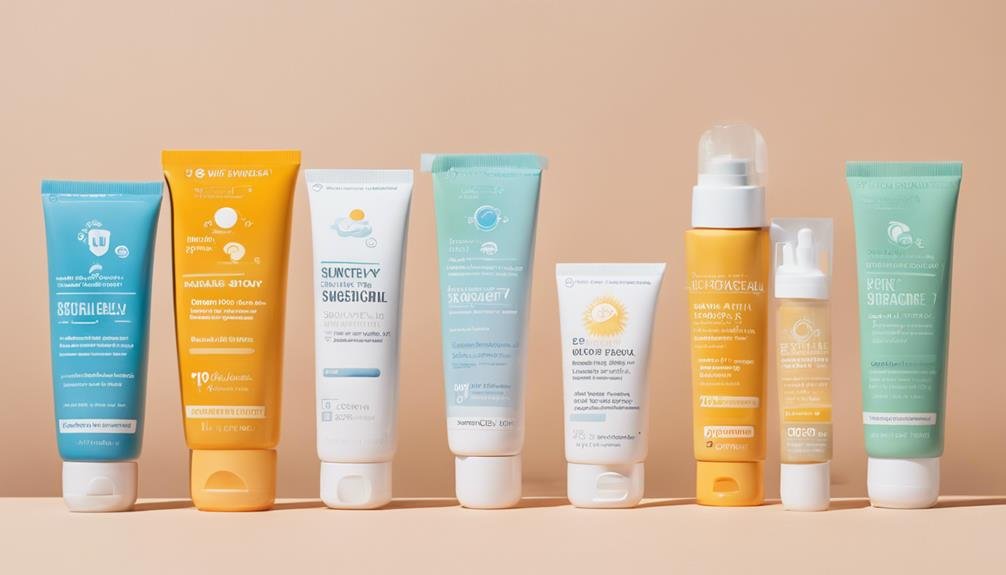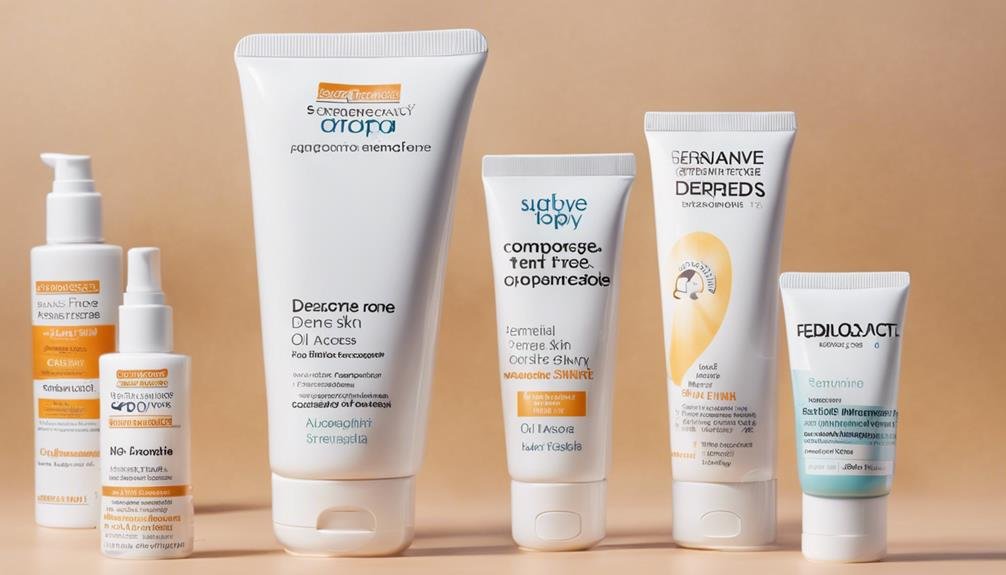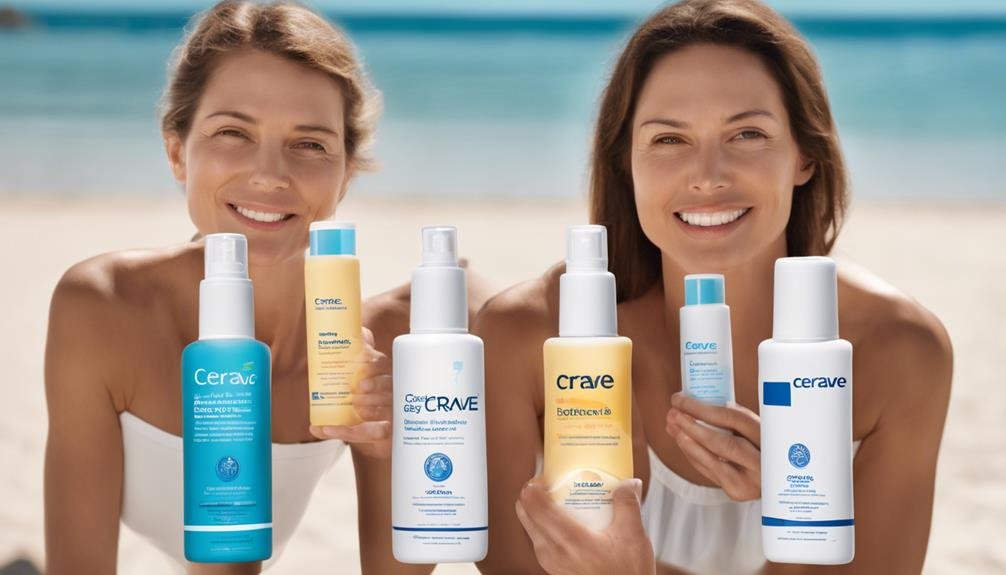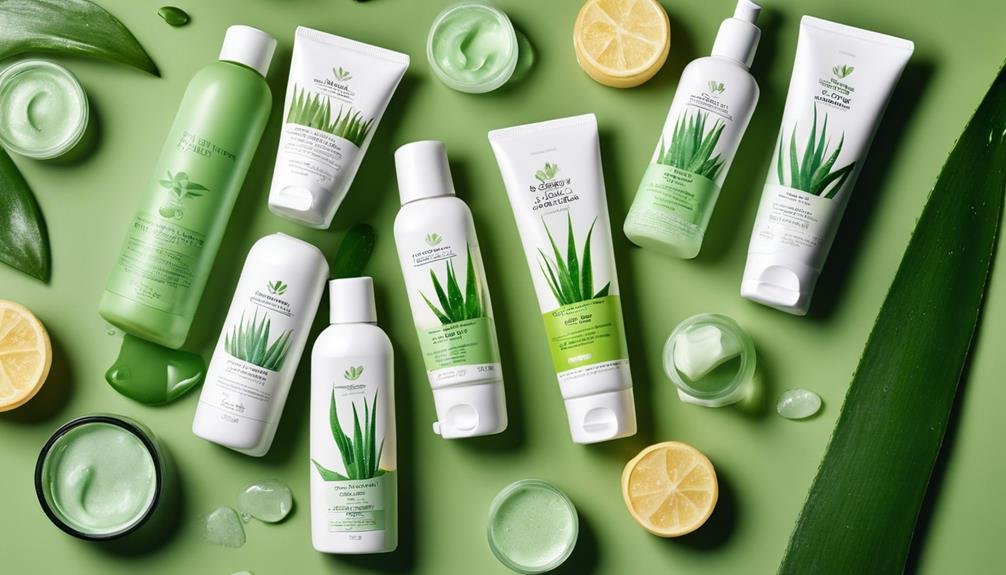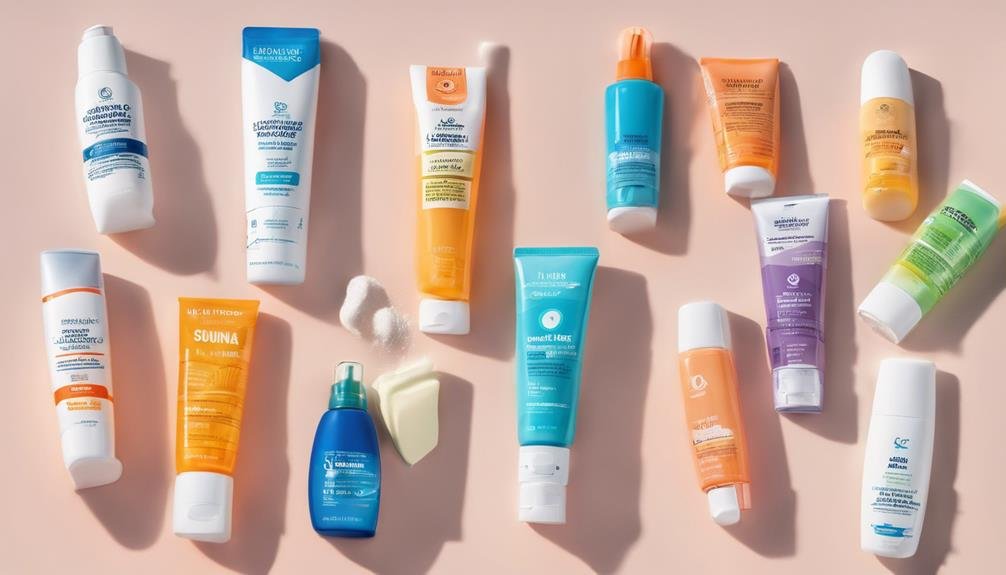When it comes to safeguarding your sensitive skin from harmful UV rays, choosing the right sunscreen is paramount. Understanding the nuances of mineral-based formulations and the importance of ingredients like zinc oxide and titanium dioxide can make a significant difference in your sun protection routine. But, what sets these top sunscreens apart, ensuring they cater specifically to sensitive skin needs? Let's explore the key features and benefits of these carefully crafted products designed to provide gentle yet effective sun protection for your delicate skin.
Key Takeaways
- Opt for mineral-based sunscreens with zinc oxide and titanium dioxide for gentle, broad-spectrum protection.
- Choose fragrance-free and hypoallergenic options to reduce skin reactions.
- Look for non-comedogenic, water-resistant formulas for acne-prone and sensitive skin.
- Consider aloe vera-infused sunscreens for soothing hydration without irritation.
- Select lightweight, high SPF sunscreens for daily wear and enhanced protection.
Gentle Mineral-Based Sunscreens
When selecting sunscreens for sensitive skin, opting for gentle mineral-based options can offer effective protection without causing irritation. Mineral sunscreens contain active ingredients like zinc oxide and titanium dioxide, which sit on the skin's surface and deflect the sun's rays, making them ideal for sensitive skin types. These ingredients are less likely to cause irritation or allergic reactions compared to chemical sunscreens, making them a popular choice for those with delicate skin.
Mineral sunscreens work by forming a physical barrier that reflects harmful UV rays away from the skin, providing broad-spectrum protection against both UVA and UVB rays. They're also less likely to clog pores, making them suitable for acne-prone skin. Look for mineral sunscreens labeled as "broad-spectrum" and with an SPF of 30 or higher to ensure adequate protection from the sun's damaging effects.
Remember to apply mineral sunscreen generously and reapply every two hours, especially when swimming or sweating.
Fragrance-Free Options
To cater to the needs of sensitive skin, exploring fragrance-free options in sunscreens can further enhance the protection and comfort level of your skincare routine. Fragrance, often listed as "parfum" or "fragrance" on labels, can be a common irritant for sensitive skin, causing redness, itching, or even allergic reactions. By opting for fragrance-free sunscreens, you reduce the risk of potential skin reactions while still enjoying effective sun protection.
Look for sunscreens labeled "fragrance-free" or "without added fragrance" to ensure that no artificial scents have been included in the formula. These sunscreens are designed to be gentle on the skin, making them suitable for individuals with sensitive skin conditions like eczema or rosacea. Fragrance-free options are also ideal for those who prefer products without strong scents or who are sensitive to perfumes.
When selecting a fragrance-free sunscreen, prioritize broad-spectrum protection, ensuring defense against both UVA and UVB rays. Remember to apply sunscreen generously and reapply every two hours for optimal protection throughout the day.
Broad-Spectrum Protection Choices
For comprehensive protection against both UVA and UVB rays, selecting broad-spectrum sunscreens is essential. Broad-spectrum sunscreens work to shield your skin from the harmful effects of both types of ultraviolet rays, which can cause premature aging, sunburn, and an increased risk of skin cancer. When choosing a sunscreen for sensitive skin, opt for a broad-spectrum formula to ensure you're adequately protected.
Look for ingredients like zinc oxide and titanium dioxide, which provide effective broad-spectrum coverage while being gentle on sensitive skin. These mineral-based ingredients are less likely to cause irritation or allergic reactions compared to chemical filters often found in sunscreens.
Hypoallergenic Formulas
Wondering how to protect your sensitive skin from potential irritants in sunscreen? Look for hypoallergenic formulas designed to minimize the risk of allergic reactions. These sunscreens are crafted with gentle ingredients that are less likely to cause irritation, making them ideal for those with sensitive skin.
Hypoallergenic sunscreens are free from common allergens such as fragrances, dyes, and preservatives that can trigger skin reactions. They undergo rigorous testing to ensure they're less likely to cause allergic responses, providing a safer option for individuals with sensitive skin.
When choosing a hypoallergenic sunscreen, opt for products labeled as such by reputable brands or that have been recommended by dermatologists. These sunscreens are formulated to be gentle on the skin while still offering effective sun protection.
Non-Comedogenic Picks
If you're concerned about clogged pores and breakouts, consider opting for non-comedogenic sunscreens to safeguard your sensitive skin. Non-comedogenic sunscreens are specially formulated to not clog pores or aggravate acne-prone skin, making them ideal for individuals with sensitive skin. These sunscreens are designed to provide effective sun protection without causing additional skin issues. Look for ingredients like zinc oxide and titanium dioxide, which are less likely to cause pore blockages.
Some non-comedogenic options also contain soothing ingredients like aloe vera or niacinamide to calm and protect sensitive skin.
When selecting a non-comedogenic sunscreen, ensure it offers broad-spectrum protection against both UVA and UVB rays, with an SPF of 30 or higher. Additionally, choose a formula that's lightweight, oil-free, and fragrance-free to minimize the risk of irritation. By incorporating a non-comedogenic sunscreen into your daily skincare routine, you can shield your sensitive skin from the sun's harmful rays without worrying about clogged pores or breakouts.
Water-Resistant Varieties
Consider opting for water-resistant varieties of sunscreen to ensure long-lasting protection against water activities or excessive sweating. Water-resistant sunscreens are designed to stay effective even after exposure to water for a certain period, providing you with continuous protection.
When engaging in water sports, swimming, or any activity that causes you to sweat profusely, opting for a water-resistant sunscreen can help prevent the product from washing off easily.
Look for sunscreens labeled as "water-resistant" or "very water-resistant," as these indicate the level of protection the product offers during water exposure. Remember to reapply water-resistant sunscreen according to the instructions on the label, especially after swimming or sweating, to maintain its effectiveness.
Water-resistant sunscreens are ideal for individuals with sensitive skin who need reliable protection that won't easily rub off. These formulations are often gentle on the skin while providing the necessary sun protection, making them a great option for those with sensitive skin who enjoy water activities or have an active lifestyle.
Dermatologist-Recommended Brands
When selecting sunscreens for sensitive skin, dermatologist-recommended brands can provide assurance of quality and effectiveness. Dermatologists often suggest brands like EltaMD, La Roche-Posay, and Aveeno for individuals with sensitive skin due to their gentle formulations and broad-spectrum protection.
EltaMD offers a range of sunscreens that are non-comedogenic and free of fragrances and parabens, making them suitable for sensitive skin.
La Roche-Posay is known for its Anthelios line, which includes sunscreens with antioxidants and soothing ingredients to protect and calm sensitive skin.
Aveeno, a brand recognized for its use of colloidal oatmeal, provides sunscreens that are gentle and suitable for sensitive skin types. These dermatologist-recommended brands prioritize skin health and safety, making them reliable choices for those with sensitive skin concerns.
Non-Greasy Sunscreens
For those seeking sun protection without the greasy feeling, non-greasy sunscreens are an ideal choice. Non-greasy sunscreens provide the necessary protection against harmful UV rays without leaving your skin feeling oily or shiny. These formulations are designed to absorb quickly into the skin, leaving behind a matte finish that's perfect for everyday wear.
When selecting a non-greasy sunscreen, look for products labeled as "oil-free" or "matte finish" to ensure a lightweight feel. These sunscreens are often water-based or gel-based, making them suitable for sensitive skin types that are prone to breakouts or irritation.
Popular non-greasy sunscreen brands include Neutrogena Ultra Sheer Dry-Touch Sunscreen, La Roche-Posay Anthelios Melt-in Milk Sunscreen, and EltaMD UV Clear Broad-Spectrum SPF 46. These sunscreens offer broad-spectrum protection and are recommended by dermatologists for their effectiveness and non-comedogenic properties.
When applying non-greasy sunscreen, remember to follow the recommended usage instructions and reapply every two hours or after swimming or sweating to ensure optimal protection throughout the day.
Soothing Aloe Vera Infused Products
Aloe vera, known for its soothing and hydrating properties, is a popular ingredient in skincare products aimed at providing relief for sensitive skin. If you have sensitive skin, opting for soothing aloe vera-infused products can be a game-changer in your skincare routine. Aloe vera is rich in vitamins, minerals, and antioxidants that help calm and nourish delicate skin, making it an ideal choice for those prone to irritation or redness.
When selecting a sunscreen with aloe vera, look for products that are labeled as gentle, hypoallergenic, and free from harsh chemicals and fragrances. These formulations are designed to provide sun protection without causing further irritation to sensitive skin.
Additionally, aloe vera can help to moisturize and soothe the skin, promoting a healthier complexion.
Zinc Oxide and Titanium Dioxide Sunblocks
Zinc oxide and titanium dioxide sunblocks are known for their broad-spectrum protection against harmful UV rays. These mineral-based sunscreens are gentle on sensitive skin, making them a great choice for those prone to irritation. Here are some top sunblocks featuring zinc oxide and titanium dioxide:
| Brand | SPF | Features |
|---|---|---|
| EltaMD UV Clear | 46 | Oil-free, lightweight, suitable for acne-prone skin |
| Blue Lizard Sensitive | 30+ | Fragrance-free, paraben-free, and dermatologist-recommended |
| Badger Sport | 35 | Water-resistant for up to 80 minutes, biodegradable |
These sunblocks not only shield your skin from UVA and UVB rays but also provide a soothing barrier. Zinc oxide and titanium dioxide work by sitting on top of the skin to deflect the sun's rays, making them less likely to cause a reaction. When looking for a sunblock for sensitive skin, consider these mineral-based options for effective protection without irritation.
Lightweight and Fast-Absorbing Choices
With a focus on lightweight and fast-absorbing options, sunscreens that quickly blend into the skin offer a convenient solution for daily sun protection. These types of sunscreens are perfect for those with sensitive skin who want a product that feels comfortable and doesn't leave a heavy or greasy residue. Look for sunscreens labeled as "oil-free," "non-comedogenic," or "gel-based" for a formula that won't clog pores or feel heavy on your skin.
When selecting a lightweight and fast-absorbing sunscreen, opt for products that contain ingredients like hyaluronic acid, glycerin, or silicones, as these can provide a smooth application and a weightless feel. Additionally, sunscreens with a matte finish are great for those with oily or combination skin types.
Remember to choose a broad-spectrum sunscreen with an SPF of at least 30 to ensure adequate protection against both UVA and UVB rays. Lightweight sunscreens are a fantastic option for daily wear, offering protection without the heavy feeling often associated with traditional sunscreens.
High SPF Sensitive Skin Sunscreens
For individuals with sensitive skin, selecting a high SPF sunscreen is crucial to providing effective sun protection without causing irritation. High SPF sunscreens offer enhanced protection against harmful UV rays, which is particularly important for sensitive skin that can easily become irritated or damaged by sun exposure. Look for sunscreens with SPF 30 or higher to ensure adequate protection.
When choosing a high SPF sunscreen for sensitive skin, opt for products labeled as "broad-spectrum" to shield against both UVA and UVB rays. Ingredients like zinc oxide or titanium dioxide are gentle on sensitive skin and provide effective sun protection without clogging pores or causing breakouts.
Some recommended high SPF sunscreens for sensitive skin include La Roche-Posay Anthelios Melt-in Milk Sunscreen with SPF 60, Neutrogena Sensitive Skin Face Liquid Sunscreen with SPF 50, and Aveeno Positively Mineral Sensitive Skin Sunscreen with SPF 50. These options are formulated to be gentle, non-irritating, and suitable for daily use on sensitive skin.
Frequently Asked Questions
Can Sensitive Skin Sunscreens Be Used on Children?
Yes, sensitive skin sunscreens can typically be used on children. However, it's crucial to choose products specifically designed for kids' delicate skin. Always check the label for age recommendations and consult with a pediatrician if unsure.
Are Mineral Sunscreens Reef-Safe?
When choosing mineral sunscreens, look for ingredients like zinc oxide and titanium dioxide to ensure reef safety. These minerals provide effective UV protection without harming coral reefs, making them a great eco-friendly choice for your skin and the environment.
Do Hypoallergenic Sunscreens Prevent Skin Reactions?
Hypoallergenic sunscreens may help prevent skin reactions for some individuals with sensitive skin. It's essential to choose products with gentle ingredients and perform patch tests. Consult with a dermatologist for personalized recommendations based on your specific needs.
How Often Should Sunscreen Be Reapplied on Sensitive Skin?
You should reapply sunscreen on sensitive skin every two hours, even on cloudy days. Remember, just like a good book, you must read it cover to cover to ensure the plot unfolds without any unexpected twists!
Are There Sunscreens Suitable for Acne-Prone Sensitive Skin?
For acne-prone sensitive skin, look for oil-free, non-comedogenic sunscreens with zinc oxide or titanium dioxide. These mineral-based options are less likely to cause breakouts. Reapply every 2 hours, especially if sweating or swimming.
Conclusion
In conclusion, choosing the right sunscreen for sensitive skin is essential to protect against harmful UV rays without causing irritation. While some may argue that mineral-based sunscreens are thicker and leave a white cast, advancements in formulations have created lightweight and fast-absorbing options that blend seamlessly into the skin. By prioritizing ingredients like zinc oxide and titanium dioxide, along with fragrance-free and hypoallergenic formulas, individuals with sensitive skin can enjoy effective sun protection without compromising on comfort or appearance.



